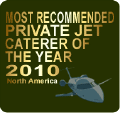| BlueSky Business Aviation News | ||||||||||||||||||
| . | ||||||||||||||||||
Why don’t you treat your body with the same respect as your aircraft while traveling? You need energy, and loads of it, to perform at your optimum level under the extreme conditions in which you work. Your fuel comes from the food you consume and that food provides the vitamins and minerals your body needs to convert the food to energy just as the aircraft engines convert the fuel to energy. Good quality fuel will enhance the engines performance and reduce maintenance costs in the long run. Asking your body to adhere to a busy schedule while eating a poor diet is like expecting your aircraft to run on contaminated fuel. The aircraft may work fine for a little while, but, eventually it will cost you. Your body is going to do the same. You’ll be exhausted, possibly make poor judgments, react slower to emergencies, overlook important details, and even may be irritable a good bit of the time. In many cases, fatigue might be aggravated by poor dietary choices such as the lack of healthy carbohydrates or inadequate water intake. Understanding the connection between diet and energy production can help you choose the best foods to fight fatigue. So how do you strategize to combat fatigue with diet? Plan to include a selection of menu items that yield high levels of vitamins and minerals. These are the organic nutrients the body uses to maintain normal metabolism and health. Vitamins act as chemical partners for the enzymes involved in cell production and tissue repair of your body. Minerals help facilitate the vitamins being absorbed by your body. What you eat during the day will have a significant impact on your energy levels, so it's vital to eat the right foods at the right times. The food you eat provides the only source for these vitamins and minerals since most cannot be manufactured in the body ,and its inconvenient to travel with handfuls of vitamin tablets. Let’s focus on the vitamins and minerals responsible for the energy which offsets fatigue. Vitamins that increase energy and the foods that have them
Foods to consume to combat fatigue
Minerals that enhance energy and where to find them in food Several minerals also assist in energy metabolism and provide extra energy to fight fatigue. These minerals are Phosphorus, Zinc, Iodine, Copper, and Chromium. Here are the food sources you need to include as part of your meals to get these minerals:
In addition to these foods, you want to maintain a varied diet of fruit, vegetables, whole grains, and lean protein sources for good health and energy. Watch your portion sizes since overeating also drains your energy. Take the time to request that your catering source help plan menus to include these foods so you can get the appropriate vitamins and minerals that will help you receive a steady stream of the energy that is drained from you while on the road. Take precautions on your fuel to avoid costly problems later. Avoid processed options as much as possible and instead choose foods filled with whole grain that are natural and that slow the digestion process. You can, with a little planning, have more energy and stay healthier while traveling.
Let me introduce myself . . . My name is Paula Kraft and I am founder and President of Tastefully Yours Catering, an aviation specific caterer, located in Atlanta, Georgia for 35 years.
Currently I am an active member of the NBAA Flight Attendant Committee Advisory Board and the NBAA International Flight Attendant Committee, Women in Corporate Aviation, Women in Aviation International, National Association of Catering Executives, International Flight Catering Association, the International Food Service Association and the International Caterer’s Association. I have coordinated training programs and clinics for NBAA, EBAA and BA-Meetup conference attendees for over 10 years, created mentoring programs for caterers and flight attendants to broaden their aviation culinary skills, and to assist them in adapting to the unique challenges and constraints found in catering for general aviation. I recognize the need for training and have worked closely with flight departments, flight crews, schedulers and customer service reps at the FBOs to ensure that catering specific training provides information and skills necessary to reduce risk while assisting them in their job duties that include safe food handling, catering security, accurate transmission of food orders, and safe food production, packaging and delivery. I fell into aviation catering quite by accident. I was the in-house caterer and bakery supplier for Macy’s department stores in Atlanta when catering was ordered for a Macy’s customer which was soon to change my life. After the client enjoyed the catering provided, I was summoned to the client’s corporate office to provide several of the items delivered through Macy’s to the executive dining room. Within a week, I was providing food for the flight department and my first order was for the President of a foreign country (as I was too be told soon after). So, here I am, some 35 years later, still loving every minute of every day in aviation catering.
|
||||||||||||||||||




